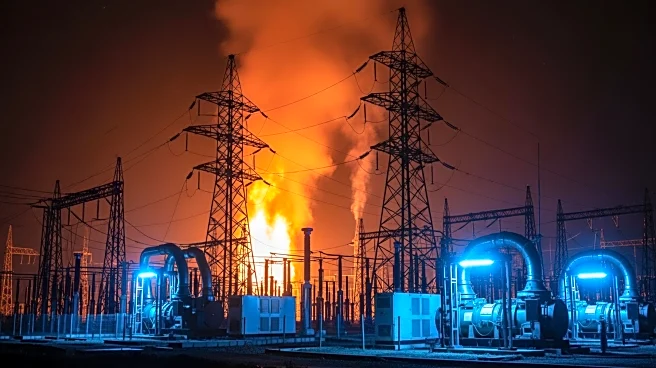What's Happening?
Ukraine has conducted a drone strike on the Shatura Power Station in the Moscow region, leading to a fire and the activation of emergency backup systems. The incident occurred on Sunday, with several drones
reportedly destroyed by Russian air defense forces, while others managed to hit the facility, causing a fire. The governor of the Moscow region, Andrei Vorobyov, confirmed the attack and stated that mobile heating units were deployed as temperatures in the area were near freezing. The fire affected three transformers at the station, each measuring approximately 65 square meters. The attack is part of ongoing tensions between Russia and Ukraine, with Russia having targeted Ukrainian energy infrastructure in recent months.
Why It's Important?
The drone strike on the Shatura Power Station highlights the escalating conflict between Russia and Ukraine, particularly in the realm of energy infrastructure. This incident underscores the vulnerability of critical infrastructure to drone attacks, which can have significant implications for energy security and civilian safety. The activation of backup systems and deployment of mobile heating units indicate the potential for widespread disruption in energy supply, affecting local residents and businesses. As Russia relies heavily on Soviet-era heating stations, any damage to these facilities can have far-reaching consequences for its energy distribution network. The attack also reflects the ongoing strategic efforts by Ukraine to counter Russian aggression and disrupt its energy capabilities.
What's Next?
The immediate focus will likely be on assessing the damage to the Shatura Power Station and restoring normal operations. Russian authorities may increase security measures around critical infrastructure to prevent future attacks. The incident could lead to heightened military responses from Russia, potentially escalating the conflict further. International stakeholders may call for diplomatic interventions to de-escalate tensions and prevent further attacks on civilian infrastructure. Additionally, there may be discussions on enhancing drone defense systems to protect vital energy facilities from similar threats.
Beyond the Headlines
The use of drones in military operations raises ethical and legal questions about the conduct of warfare and the protection of civilian infrastructure. This incident may prompt discussions on international regulations governing drone warfare and the need for agreements to safeguard critical infrastructure. The attack also highlights the evolving nature of modern warfare, where technology plays a crucial role in strategic operations. As drone technology becomes more accessible, countries may need to invest in advanced defense systems to mitigate risks and protect their national interests.









